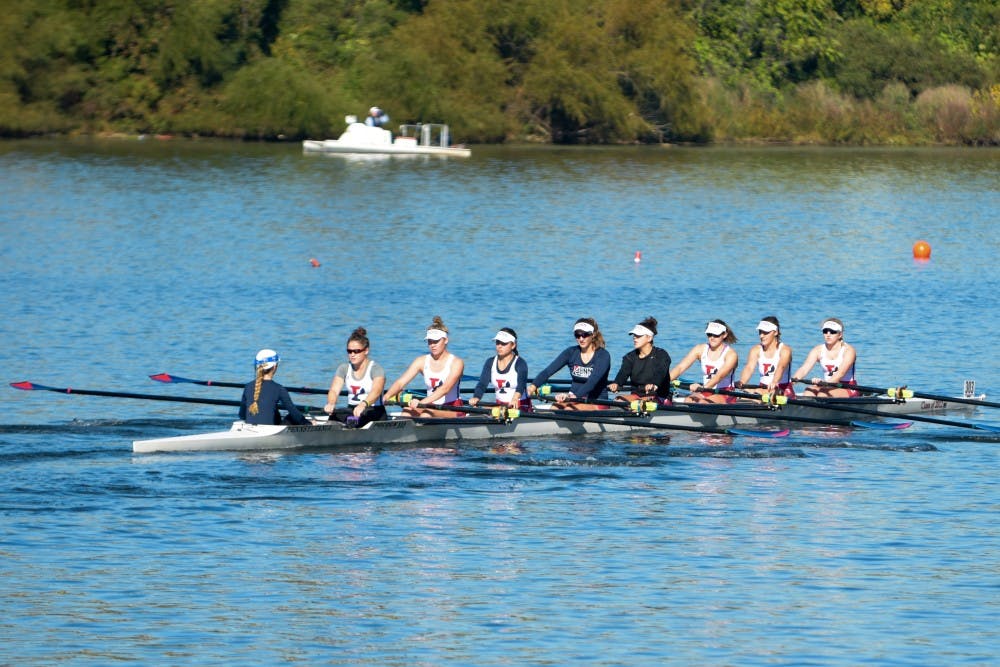Penn and the rest of the Ivy League have been at the top of the rankings for centuries.
While the Ivy League might be known for its prowess in academics, there’s another set of ranking lists that are a familiar home to the members of the Ancient Eight: the national men’s heavyweight, men’s lightweight, and women’s rowing rankings.
While they share the top echelons of the sport with schools like Stanford, Cal, Duke, and Wisconsin, no conference has had as much dominance from of all its schools.
There are a lot of factors that go into producing a strong rowing team, but a big one is tradition. It should come as no surprise that the Ivies continually produce such good rowers. The first intercollegiate rowing competition was held between Harvard and Yale in 1852 — two years after California became a state, and long before the founding of either Stanford or Cal.
“There is great tradition and so much of the rowing world was based on the format and the traditional movements of cup races and in some ways it’s a sport that really has transcended time,” women’s rowing coach Wesley Ng said.
At Penn, this tradition is upheld both by the University itself and by a long line of dedicated alumni, who continue to provide support for the program long after they leave it. That’s not to say that the Ivies are living in the past — far from it. They’re at the top of their game in the present, and that requires constant effort on the part of the University and the rowing coaches.
They say there’s no substitute for hard work, but it also helps that the Quakers employ some of the top rowing coaching staffs in the country. Men’s heavyweight rowing coach Geoff Bond won two national titles as a rower at Brown and five more as a coach at Cal. Ng won a national title as a rower at Yale. Since coming to Penn, he has greatly improved the team, winning numerous awards along the way. Additionally, men’s lightweight rowing coach Colin Farrell won a gold medal at the 2008 World Rowing Championships and helped guide Penn to the Grand Final at the IRA National Championships for just the fourth time since 1997.
“[Sustaining a competitive team] starts with people, being able to attract the best student-athletes, followed closely by keeping the best and most experienced coaching staff we can. Those two things are resources that we really are always trying to improve and cultivate,” Ng explained.
RELATED:
With cross-country trips, Penn rowing has unique opportunities for competing and bonding
What are you doing at 7 a.m.? Penn rowing is probably practicing
To have the best student-athletes, rowing teams must first recruit the best rowers in the country. This is no small task, as Penn rowers come from all over the world. A big part of this process is convincing those rowers to come to Penn, as many have received offers from top schools around the country.
“I think that our process begins with following the race results of the best domestic and international students that we can find,” Ng said. “Students that might be [the] most academically qualified people, but also the people that are the most passionate about moving the boat and about training for rowing [are the people we try to recruit].”
Once the team has identified the rowers they want to recruit, the next step is to get them to come to Penn over other top schools.
“We do overlap a ton with the best schools in the country,” Ng said. “The key point for Penn is we offer a little bit of a different approach to training, certainly a different approach to team culture that we think fits best for our university and the combination of what Penn has to offer academically, but also being in Philadelphia is pretty amazing [and] rowing on boathouse row it’s one of the most iconic places to train in the United States.”
The Ivy League is home to some of the most storied and successful rowing programs in the country, and has been able to pair that with unparalleled academic success for over a century. Thanks to the premiere coaching staffs, student-athletes, and facilities, it looks like that success will continue for a long time.



